A chicken's bedtime: What is it and why does it change?
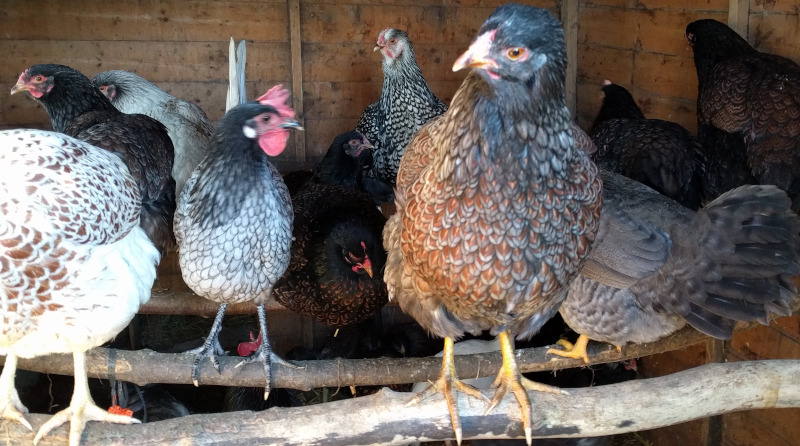
Chickens instinctively know that when the sun begins to go down and the light fades that it is time to roost for the night.
In the wild or if left to their own devices chickens will sleep from from dusk to first light.
Do chickens have a bedtime?
Chickens do have a bedtime, they are light or photo sensitive animals that know when to go to bed.
Bedtime for chickens varies through the year depending on the both the weather and the seasons but is normally around 15 to 30 minutes before dusk.
Where I live in the northern latitudes that can be anytime from 3:30 pm in the afternoon in mid winter to after 10 pm in mid summer.
The time chickens go to bed changes with the seasons and the weather. On the shortest day of the year which for me was the 21st December this year my chickens started going to bed at 3.45 and were all done and settled by 4 pm. They were up and about at 7.40 the next morning.
Below: One of my Barnevelder hens roosting for the night.
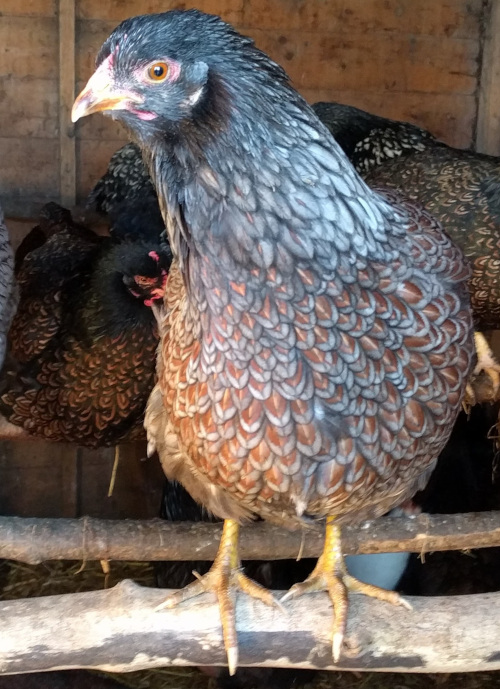
When it is lighter for longer they take longer to roost and settle for the night.
You can determine your chickens bedtime by standing around them in the half hour before dusk. When it starts to get dark, the flock seem to get a little anxious and make noise.
It's not a loud noise or cackling, but more like a whistle or the hinge of a rusty gate. This flock wide communication is accompanied by the birds going in and out of the coop and beginning to get up on the perches to roost.
All chickens make some noise at bedtime but chicks and young birds can make quite a lot of noise before bedtime.
Will they go to bed on their own?
Chickens that have been properly coop trained will go to bed on their own.
You can get your chickens to go to bed by shutting them inside the coop for at least three nights, it takes them this long to learn where home is.
Chickens will usually roost around dusk and will be asleep by sundown. The exact time will vary through the year.
If your chickens won't go to bed there is a variety of reasons and solutions.
Except when it’s seriously overcast and rainy bedtime for chickens begins 30 minutes before sundown. Make sure they’ve had a good feed, scratch is the keepers choice at this time of day as it keeps the crop fuller for longer.
Chickens are more likely to roost and settle quickly with a full crop.
How much sleep do chickens need?
Adult chickens need at least 8 hours sleep per night and laying hens will nap during the day. Adult cockerels need the least sleep and may get by on 6 hours or less whereas day old chicks need the most and may sleep for 18 hours a day in the beginning.
This is why you often hear your cockerel crowing at 4 am in the morning , they are already ready for the day.
Chicken sleep requirement tables by age:
| Age of chickens. | Minimum amount of sleep required. |
| Day old chicks. | 16 to 18 hours sleep. |
| Week old chicks. | 14 hours sleep. |
| 8 week old chicks. | 12 hours sleep. |
| 12 weeks old. | 10 hours sleep. |
| 16 weeks. | 8 hours. |
| Laying hens. | 8 hours + |
| Cockerels. | 8 hours. |
If they are comfortable, safe and secure chickens and chicks will sleep as much as they need to so you do not need to worry.
If your chickens are too loud at night try removing all sources of light and covering the windows with a shutter to make the environment darker.
Do you need to put the chickens to bed?
For most chicken keepers all you need to do to put your chickens to bed is to close the coop doors or pop hole securely just after dark.
Young or insecure birds may need to be herded into the coop and run.
Mother hen with young chicks may get caught outside easily
My chicken bedtime routine consists of checking all birds are inside the coop and closing the pop holes on the coops which don't have automatic door closers.
Can chickens sleep outside?
Unless you have a completely secure run it is not advisable to let chickens roost outside of the coop as they will be easy prey for predators and could suffer in bad weather.
Below: This hen is having an afternoon nap outdoors.
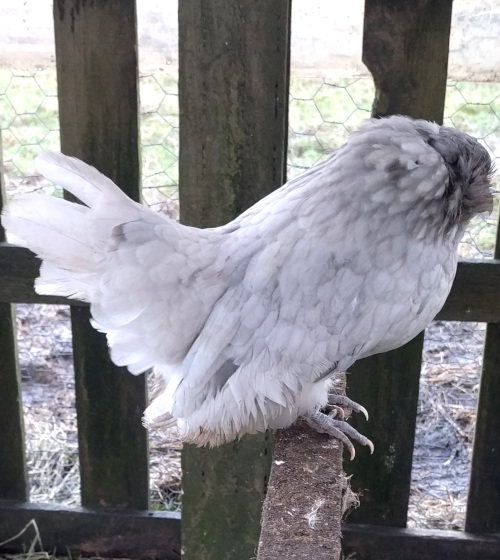
Chickens having a snooze during the day is both common and fine as their flock mates will watch out for danger.
Below: Chickens roosting in trees are easy prey for nocturnal hunters and will be down on the ground at first light when most of the predators are active.
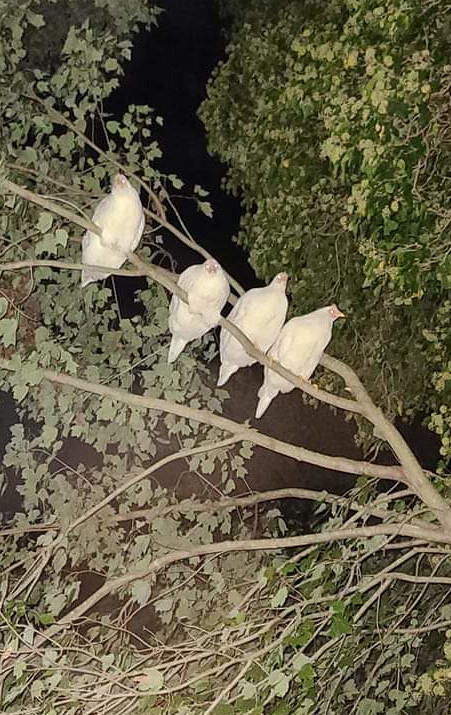
In smaller trees such as this a gust of wind could see them on the floor in the middle of the night.
During daylight hours, sleeping seems to be restricted to middle of day when birds are well fed and loafing around. This behaviour is often associated with dust bathing and flopping about in the sunshine.
Having flock mates can increase sleeping because others watch for predators.
How Do Chickens Sleep?
In the wild chickens will roost on a high branch. Some birds will tuck a head under a wing and other will let their heads droop towards the floor.
Chickens also have the amazing ability to sleep one half of their brains at any one time and leave the other half awake.
Below: Some chickens sleep stood up.
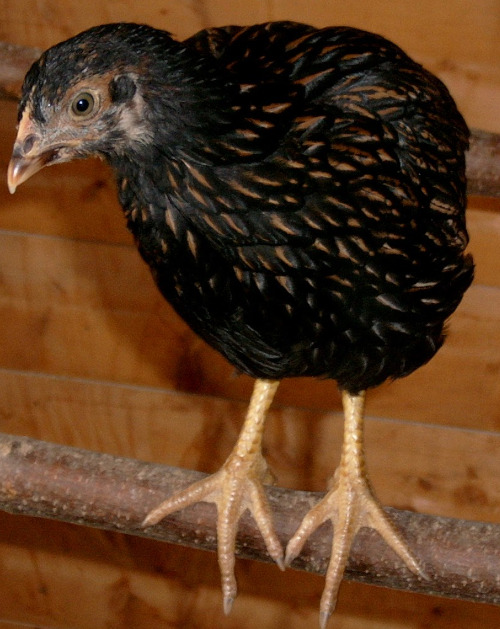
Below: Some chickens sleep directly on the perch.
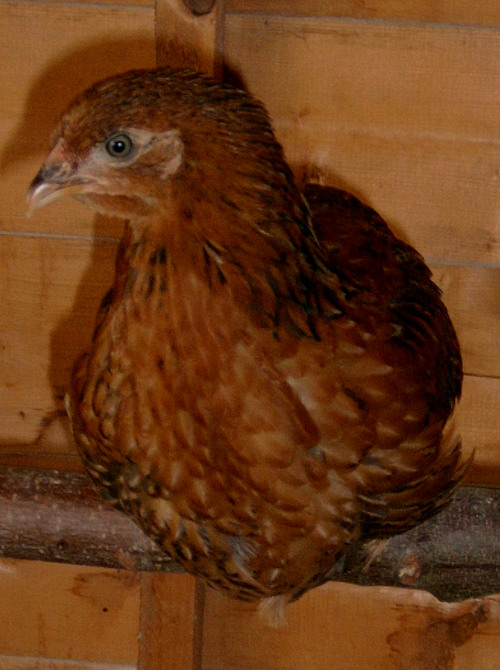
Roosters crow when disturbed and predators are often the reason. Most predators are active at dawn and dusk and from about 4:30 am, the opossums and raccoons make their morning rounds.
There is a predawn chirping of crickets and other night singers which is often enough to disturb cockerels.
